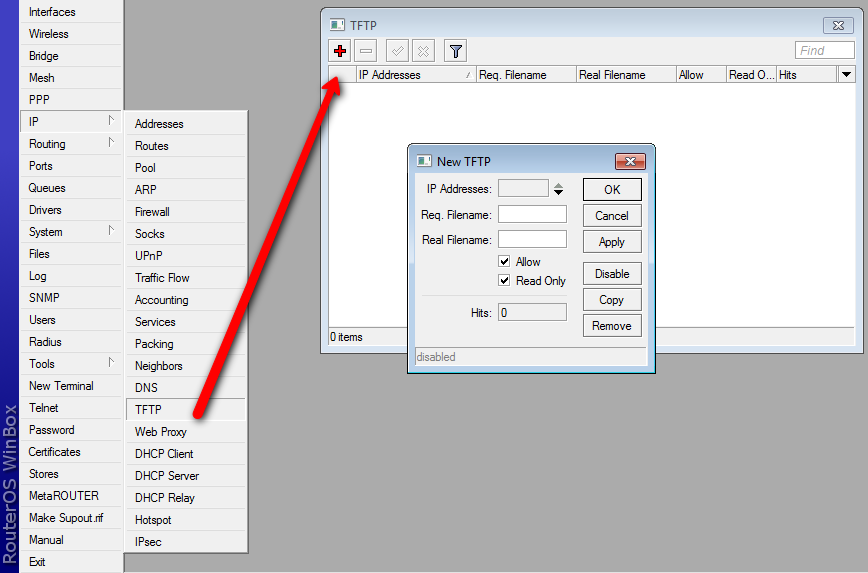Manual:IP/TFTP: Difference between revisions
Jump to navigation
Jump to search
req-filename additional information |
asterisk, dot, question mark, plus |
||
| Line 19: | Line 19: | ||
* '''brackets ()''' | * '''brackets ()''' | ||
* '''caret "^"''' - used at the beginning of the line means that line starts with | * '''caret "^"''' - used at the beginning of the line means that line starts with, | ||
* '''asterisk "*"''' - | * '''asterisk "*"''' - match zero or more times preceding symbol, | ||
example 1 ''a*'' will match any length name consisting purely of symbols ''a'' or no symbols at all | |||
example 2 ''.*'' will match any length name | |||
example 3 ''as*df'' will match adf, asdf, assdf, asssdf etc. | |||
* '''dot "."''' - matches any symbol | * '''dot "."''' - matches any symbol | ||
* '''square brackets []''' - variation between ''as[df]'' will match ''asd'' and ''asf'' | * '''square brackets []''' - variation between ''as[df]'' will match ''asd'' and ''asf'' | ||
* '''dollar "$"''' - means at the end of the line | * '''dollar "$"''' - means at the end of the line | ||
* '''question mark "?"''' will match one or none symbols, example asd?f will match ''asdf'' and ''asf'' | |||
* '''plus "+"''' will match one or more times preceding symbol, example: as+df will match asdf, assdf etc. | |||
== Examples == | == Examples == | ||
Revision as of 08:08, 14 May 2009
Summary
TFTP is a very simple protocol used to transfer files. It is from this that its name comes, Trivial File Transfer Protocol or TFTP. Each nonterminal packet is acknowledged separately. RouterOS has a built-in TFTP server since v3.22
/ip tftp
- ip-address (required) - range of IP addresses accepted as clients
- req-filename - requested filename as regular expression (regex) if field is left empty it defaults to .*
- real-filename - if above two values are set and valid, the requested filename will be replaced with this. If this field is empty, the req-filename will be used. If multiple regex are specified in req-filename, with this field you can set which ones should match, so this rule is validated. real-filename format for using multiple regex is filename\0\5\6
- allow (default: yes) - to allow connection if above fields are set. if no, connection will be interrupted
- read-only (default: no) - sets if file can be written to, if set to "no" write attempt will fail with error
- hits - how many times this configuration entry has been executed (viewable only)
req-filename field allowed regexp
allowed regexps in this field are
- brackets ()
- caret "^" - used at the beginning of the line means that line starts with,
- asterisk "*" - match zero or more times preceding symbol,
example 1 a* will match any length name consisting purely of symbols a or no symbols at all
example 2 .* will match any length name
example 3 as*df will match adf, asdf, assdf, asssdf etc.
- dot "." - matches any symbol
- square brackets [] - variation between as[df] will match asd and asf
- dollar "$" - means at the end of the line
- question mark "?" will match one or none symbols, example asd?f will match asdf and asf
- plus "+" will match one or more times preceding symbol, example: as+df will match asdf, assdf etc.
Examples
- example 1 if file is requested return file from store called sata1:
/ip tftp add req-filename=file.txt real-filename=/sata1/file.txt allow=yes read-only=yes
- example 2 if we want to give out one specific file no matter what user is requesting:
/ip tftp add req-filename=* real-filename=/sata1/file.txt allow=yes read-only=yes
- example 3 if user requests aaa.bin or bbb.bin then give them ccc.bin:
/ip tftp add req-filename="(aaa.bin)|(bbb.bin)" real-filename="/sata1/ccc.bin\\0" allow=yes read-only=yes
